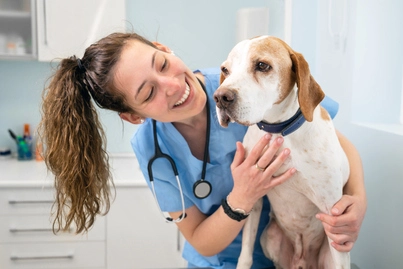Maine Coon cats are often referred to as the “gentle giants” of the feline world. These majestic creatures captivate us with their stunning appearance, intelligence, and affectionate nature. Owning a Maine Coon cat can be a rewarding experience, but it also comes with a responsibility to understand and care for their unique needs. In this essential guide, we will delve into the world of Maine Coon cats, exploring their characteristics, grooming, feeding, exercise, health considerations, and socialization to ensure your furry friend leads a happy and healthy life.
Key Takeaways
- Maine Coon cats, known as “gentle giants,” require regular grooming, a balanced diet, and consistent dental care to maintain their health.
- These cats are highly social and benefit from early socialization to manage separation anxiety and enhance their ability to interact positively with others.
- Engaging Maine Coons in interactive play and providing mental stimulation are crucial to keeping them active and content.
Characteristics of Maine Coon Cats
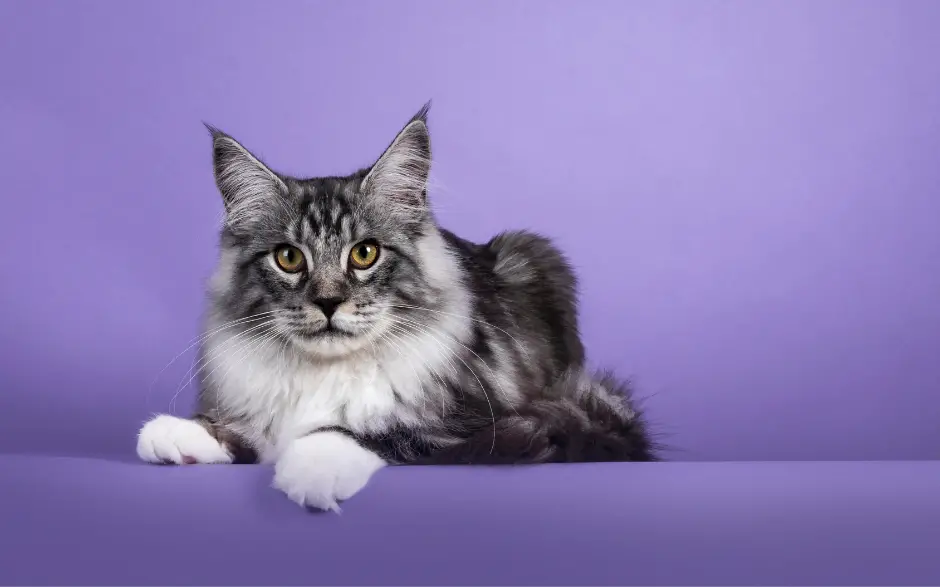
Maine Coon cats are known for their large size and muscular physique, making them one of the largest domesticated cat breeds. These gentle giants often weigh between 11 to 25 pounds, with males typically weighing more than females. Their luxurious coat consists of two thick, dense undercoats and a third, longer layer on top, complete with a bushy tail that adds to their majestic appearance.
Originating in the United States in the 1850s, the Maine Coon breed has become popular due to their distinct physical appearance and amiable, mild, and demonstrative nature.
Caring for Your Maine Coon’s Fur
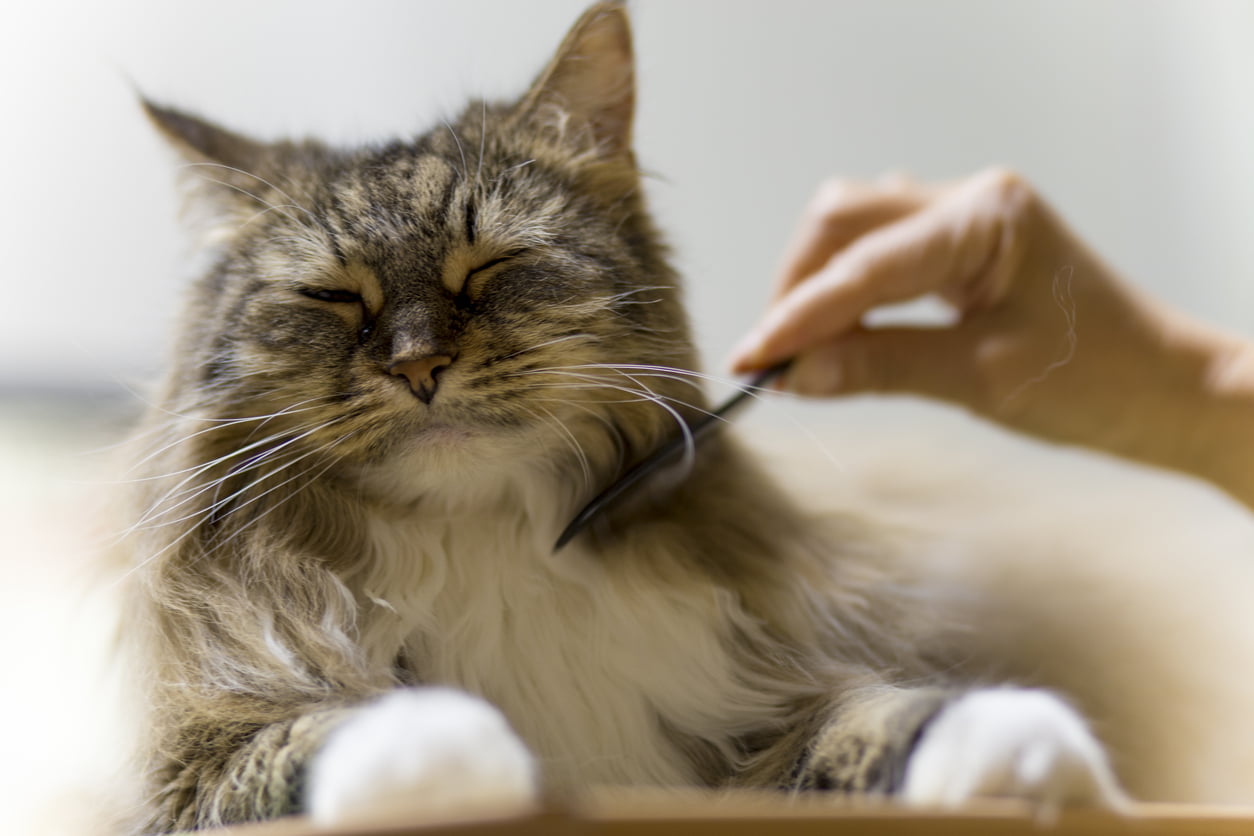
To keep your Maine Coon’s coat looking its best, proper grooming is essential. Regular grooming helps prevent mating, which can be difficult to remove if left unchecked. Grooming also helps maintain the health of your Maine Coon’s skin and coat.
In the following subsections, we will discuss the frequency of grooming, selecting the right tools, and some useful grooming tips and tricks to ensure your Maine Coon’s fur remains healthy and beautiful.
Grooming Frequency
Bi-weekly brushing sessions lasting approximately ten minutes are generally sufficient for maintaining your Maine Coon’s coat. Increased grooming may be necessary during the spring and autumn when they exhibit increased shedding.
In addition to brushing their coat, providing regular dental care, such as brushing their teeth and scheduling regular check-ups with a veterinarian, is crucial for preventing periodontal disease, tooth decay, or any issues with their gums and teeth.
Choosing the Right Tools
When grooming your Maine Coon, selecting the appropriate tools is crucial. Slicker brushes and shedding brushes are suggested for grooming a Maine Coon’s coat. When choosing a brush, ensure it has a large head for efficiency, can gather a substantial amount of hair, is simple to clean, and has an ergonomic handle for ease of use.
Using the right tools not only makes the grooming process more comfortable for your Maine Coon, but also helps maintain their coat in a healthy state, free of tangles and mats.
Grooming Tips and Tricks
To effectively groom your Maine Coon, follow these tips and tricks: Begin by eliminating any large knots with a de-matting tool before brushing. Then brush their abdomen, legs, chin, and belly with long and gentle strokes.
Clean their ears every week or two, inspecting for excess wax or signs of infection. If your Maine Coon has heavy ear discharge, use a cleaner with an applicator to drop the solution directly inside and massage the cat’s upper cheeks to loosen the wax and dirt.
If the ear discharge remains abundant or an odor is present after cleaning, consult a veterinarian for evaluation. Stop brushing when it doesn’t produce any more dead hairs. Continue only if you still feel some dead hair strands being produced.
Feeding Your Maine Coon Cat
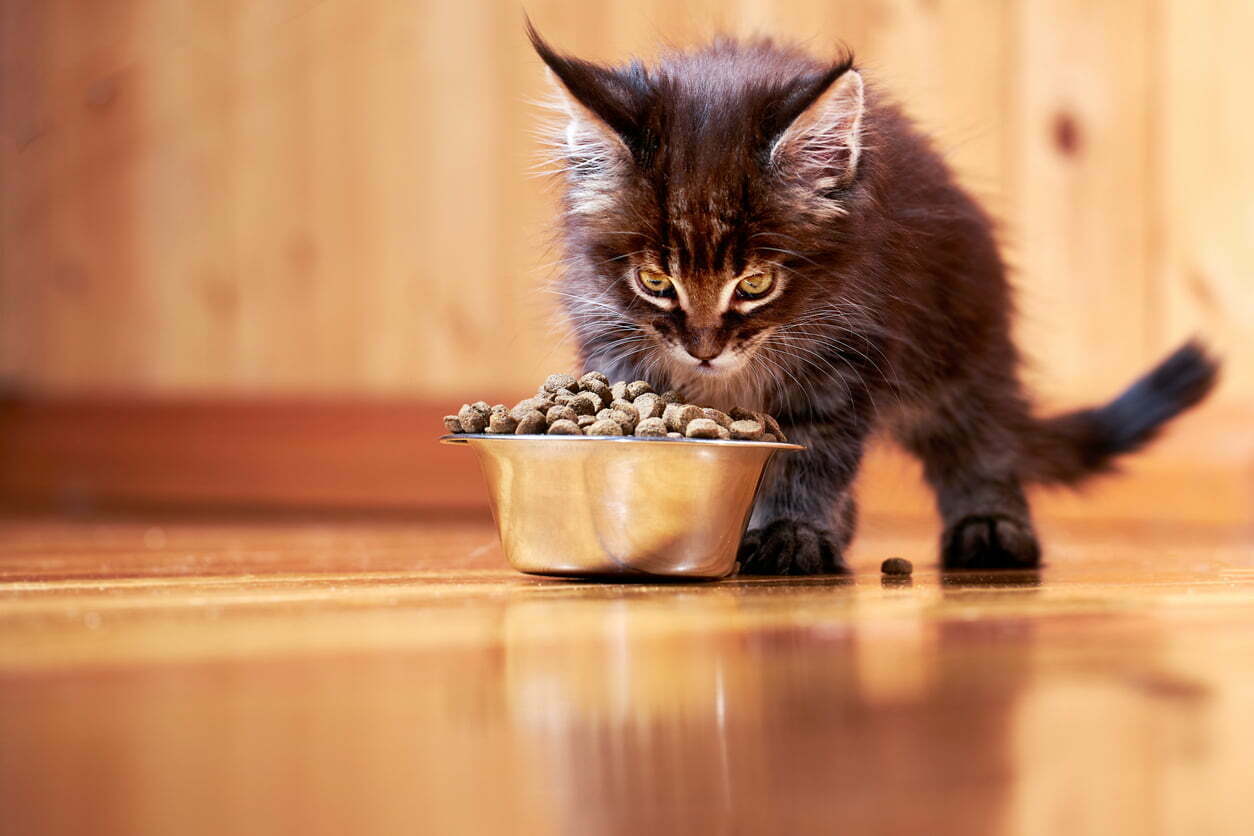
A balanced diet that meets their nutritional needs is vital for Maine Coon cats. These cats require meat in their diet to thrive, with protein being a fundamental component of their dietary requirements. Wet food is also recommended for hydration.
In the following subsections, we will explore the nutritional requirements of Maine Coon cats, the benefits and drawbacks of wet and dry food, and appropriate treats and snacks for your feline friend.
Nutritional Requirements
Maine Coon cats need a high-protein diet from a combination of wet and dry cat food, as well as raw or cooked meat due to their size. In addition to protein, a Maine Coon’s diet should also include carbohydrates, vitamins, fats, and fatty acids.
Maine Coon kittens should be fed approximately three to four times a day, while adult cats should be fed twice a day.
Wet vs. Dry Food
Both wet and dry food have their benefits and drawbacks for Maine Coon cats. Wet food has a higher moisture content, which helps keep cats hydrated, while dry food has a longer shelf life and may contribute to healthy teeth and jaws.
However, wet food can be costlier and have a shorter shelf-life than dry food and dry food can be less nutritious than wet food. It is essential to strike a balance between the two types of food to ensure your Maine Coon cat receives the proper nutrition they need.
Treats and Snacks
Appropriate treats for Maine Coon cats include raw meats such as chicken, rabbit, duck, lamb, and beef, as well as cooked eggs, which are a beneficial nutritional treat. Treats should be given in moderation to prevent overfeeding and weight gain.
As always, consult with a veterinarian if you have any concerns about your Maine Coon cat’s diet.
Connect with a verified veterinarian in minutes. No waiting for appointments or office hours. No high fees. Your pet's health made convenient and worry-free.
Providing Exercise and Mental Stimulation
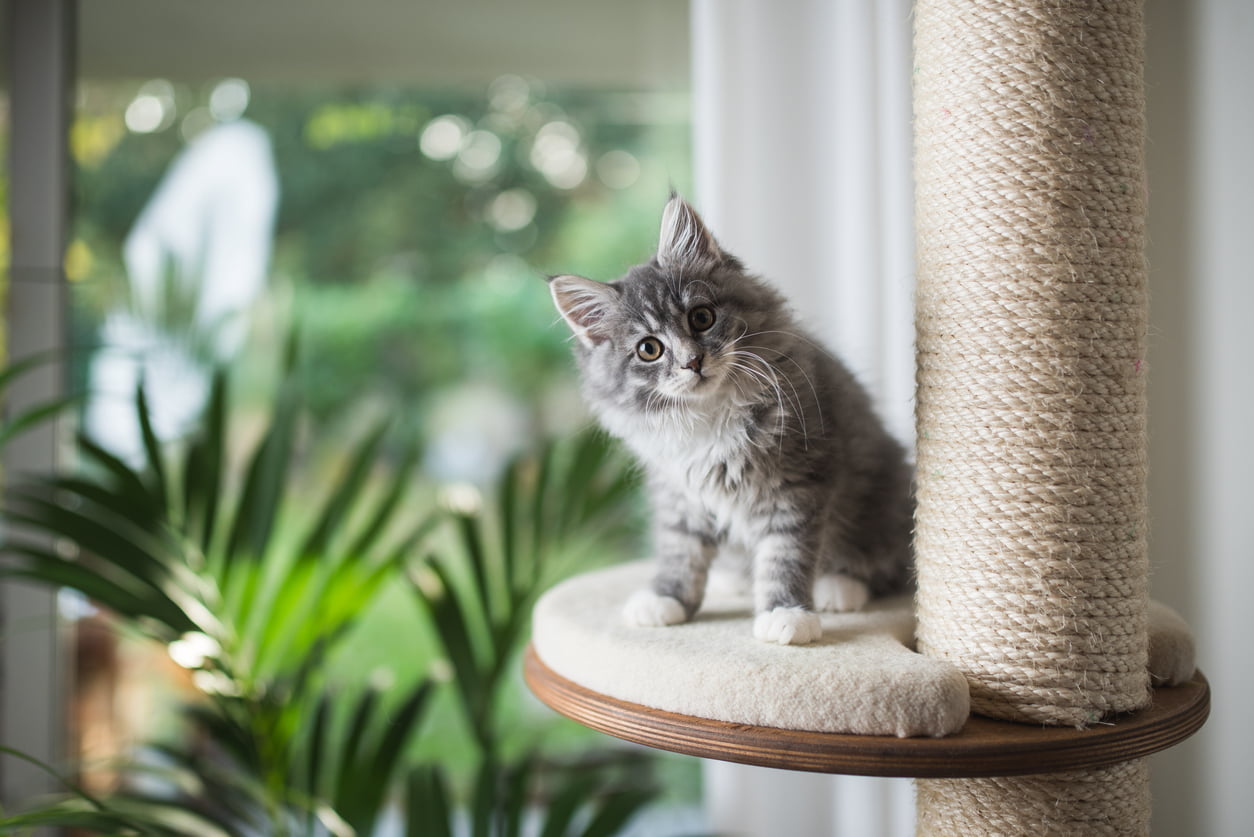
Exercise and mental stimulation are crucial for the overall well-being of your Maine Coon cat. These cats are highly intelligent and need both physical and mental challenges to stay healthy and happy.
In the following subsections, we will discuss interactive playtime, enriching the environment, and outdoor adventures that can help provide the necessary exercise and mental stimulation for your Maine Coon cat.
Interactive Playtime
Engaging in interactive playtime with your Maine Coon cat is essential for their mental and physical well-being. Suitable playtime activities include using cat wands, cat tunnels, interactive cat ball toys, puzzle feeders, laser pointers, and feather wands.
Consider purchasing some of the great toys listed below that cater to their high intelligence levels.
Interactive playtime not only keeps your Maine Coon cat entertained but also strengthens the bond between you and your feline friend.
Enriching the Environment
Creating a stimulating environment for your Maine Coon cat is crucial for their mental well-being. Provide climbable furniture such as cat trees, shelves, and window perches to encourage exploration and exercise. Interactive toys like laser pointers, feather wands, and puzzle toys can also be employed to provide mental stimulation and keep your Maine Coon cat entertained.
Don’t forget to offer opportunities for your Maine Coon cat to play in water, such as a shallow pool or a water fountain.
Outdoor Adventures
Maine Coon cats can benefit from outdoor adventures such as climbing trees, exploring, and playing with bird feathers tied to a string. They can also accompany their owners on adventures like hiking or fishing.
Supervised walks on a leash, playtime in a secure outdoor enclosure, and exploration of the outdoors in a cat-safe carrier are all suitable outdoor activities for Maine Coon cats. When taking your Maine Coon cat outdoors, ensure their safety by not allowing them outside when the temperature is below 30 degrees Fahrenheit.
Health Considerations for Maine Coon Cats
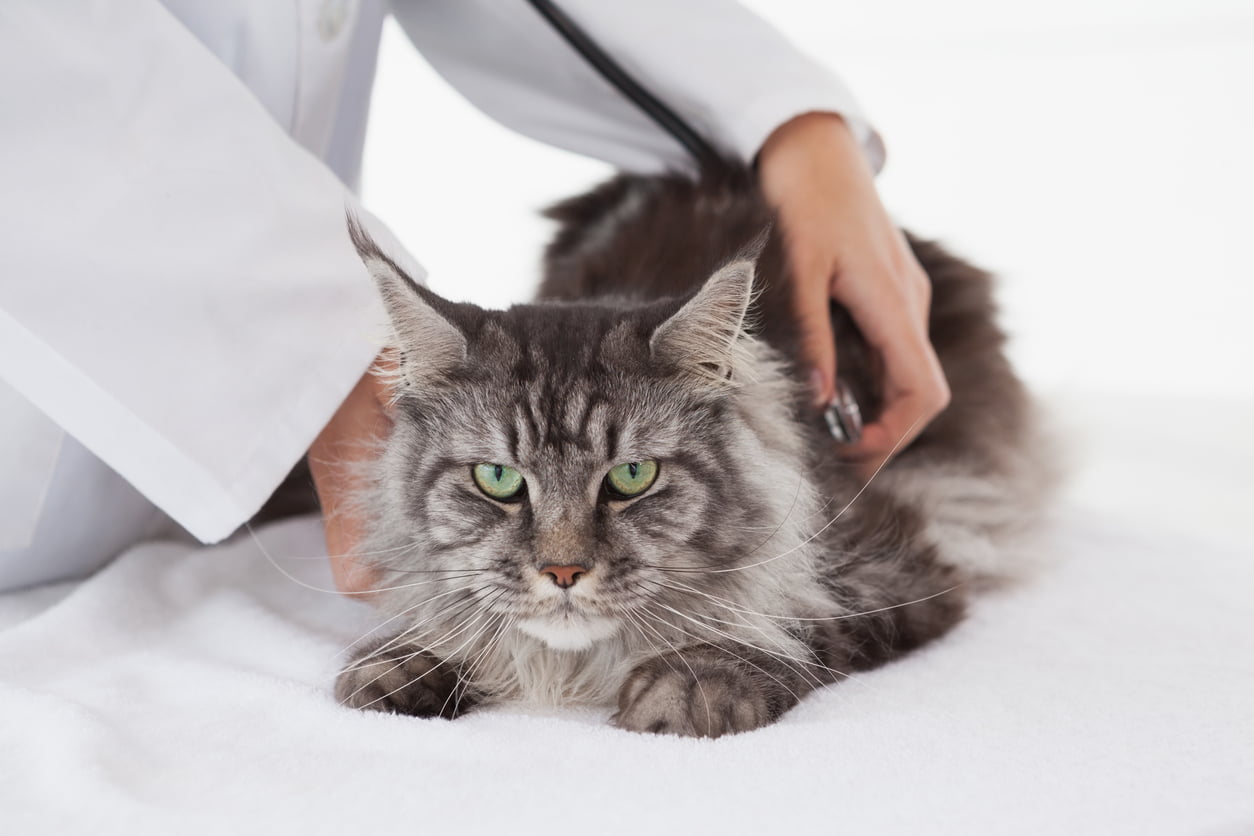
Maine Coons, like any other cat breed, can be susceptible to certain medical problems. It is important to keep an eye out for these if you own one of these cats. Regular veterinary checkups are essential to detect and treat these issues early on.
In the following subsections, we will discuss common genetic disorders in Maine Coon cats, the importance of preventative care, and signs of illness that warrant veterinary attention.
Genetic Disorders
Maine Coon cats are predisposed to several genetic disorders, including hypertrophic cardiomyopathy (HCM), polycystic kidney disease (PKD), and hip dysplasia.
Another genetic disorder that can affect Maine Coon cats is Spinal Muscular Atrophy, a hereditary disease that may reduce the lifespan of a Maine Coon kitten and cause progressive instability, unsteady gait, and posture abnormalities.
It’s essential to be aware of these genetic disorders and monitor your Maine Coon cat for any signs or symptoms.
Preventative Care
Preventative care is crucial for maintaining the health of your Maine Coon cat. Regular grooming, a high-protein, nutritionally balanced diet, fresh water, and regular dental care are all essential components of preventative care for Maine Coon cats.
Maintaining a healthy lifestyle for your Maine Coon cat can help prevent the development of health issues and ensure they live a long, happy life.
Signs of Illness
Common signs of illness in cats include lethargy, decreased appetite, and vomiting. Maine Coon cats are prone to specific health issues such as hip dysplasia, hypertrophic cardiomyopathy, and spinal muscular atrophy.
If you notice any signs of illness or changes in your Maine Coon cat’s behavior, consult with a veterinarian immediately to ensure prompt treatment and the best possible outcome.
Connect with a verified veterinarian in minutes. No waiting for appointments or office hours. No high fees. Your pet's health made convenient and worry-free.
Socializing Your Maine Coon Cat
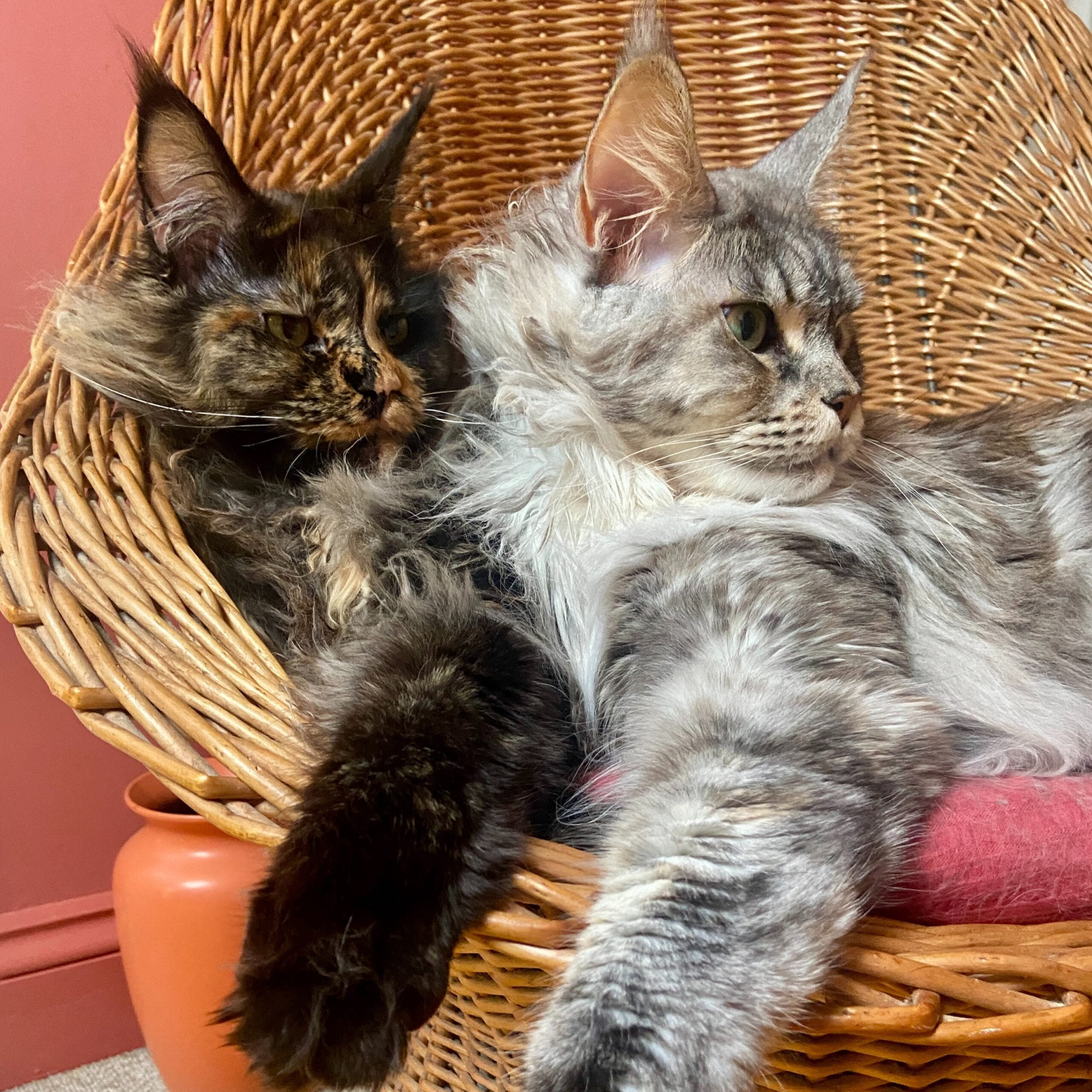
Socializing your Maine Coon cat is key to ensuring they are comfortable around people and other animals. These cats are highly sociable and enjoy spending time with their human companions, as well as getting along well with other pets, including dogs.
In the following subsections, we will discuss introducing new family members, coping with separation anxiety, and encouraging positive behaviors in your Maine Coon cat.
Introducing New Family Members
When introducing a new family member to your Maine Coon cat, it’s essential to allow both parties to interact at their own pace. You can introduce the scent of the new family member to the cat by providing food at the same time. This will help your Maine Coon cat associate the new family member’s scent with positive experiences, making the introduction process smoother and more successful.
It’s important to remember that cats are creatures of habit and may take some time to adjust to the presence of a new family member. Be patient and provide plenty of positive reinforcement to help your Maine Coon cat feel comfortable.
Coping with Separation Anxiety
Separation anxiety is a condition in which cats become overly anxious when separated from their owners or other familiar individuals. To manage separation anxiety in your Maine Coon cat, provide a secure and pleasant environment, interactive toys, and regular exercise and playtime.
Ensuring your Maine Coon cat receives mental and physical stimulation can help minimize the effects of separation anxiety and keep them happy and healthy.
Encouraging Positive Behaviors
Promoting desirable behaviors in your Maine Coon cat can be achieved using positive reinforcement, such as verbal praise, physical affection, or rewards. Clicker training, a method of positive reinforcement that utilizes a clicker to mark desirable behaviors, can also be an effective tool in teaching your Maine Coon cat which behaviors are favorable.
It’s essential to avoid shouting or striking the cat, as this can result in fear and anxiety, leading to more negative behaviors.
Summary
In this essential guide, we’ve explored the unique characteristics, grooming, feeding, exercise, health considerations, and socialization of Maine Coon cats. With proper care, attention, and love, your majestic Maine Coon cat will thrive as a cherished member of your family. By understanding and meeting their specific needs, you’ll ensure a happy, healthy, and rewarding life for both you and your gentle giant.
Frequently Asked Questions
Why are Maine Coon so expensive?
Due to their relatively rare availability and extraordinary coat and size, Maine Coon Cats come with a hefty price tag.
These cats also require more attention and resources than the average breed of cat, which can add to the overall cost.
Are Maine Coon cats high maintenance?
Overall, Maine Coon cats are not high maintenance pets. They are relatively healthy and have an even temperament, which makes them easy to care for.
Though they do need regular grooming, their overall needs are not demanding.
Is a Maine Coon cat a good pet?
Maine Coon cats are an ideal pet choice for many, thanks to their affectionate personalities and intelligence. They often form strong bonds with their owners, make excellent family pets, and get along well with other animals.
As such, they make a great pet choice.
How much money are Maine Coon cats worth?
When looking for a Maine Coon, you can expect to pay anywhere between $1000 and $2500 depending on the breeder. With careful consideration, you can find the perfect companion for your home.
Are Maine Coon cats good for beginners?
Maine Coons are intelligent, gentle cats that can make great companions for first-time owners. They’re loyal and loving creatures that enjoy affection and spending time with their human families, which makes them a perfect fit for novice pet owners.
Maine Coons are known for their large size and thick fur, which requires regular grooming. They also have a tendency to be vocal, so it’s important to be prepared for some situations.

